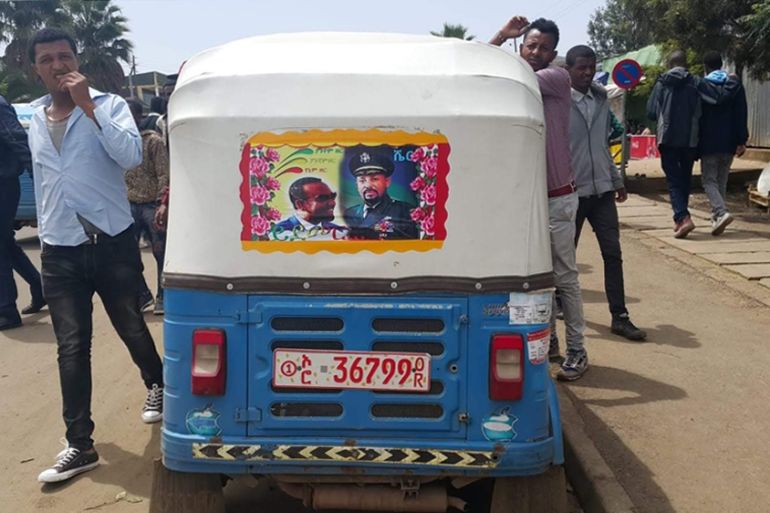Abiy Ahmed a ‘painkiller, not a cure’ for Ethiopia’s problems
People in Ginchi town, where the first anti-government protests took place, hope the new PM will effect real change.

Ginchi, Ethiopia – The people in the small town of Ginchi in central Oromia region are mostly farmers, earning their livelihood by working on land like most in Ethiopia.
Until about three years ago most Ethiopians had never heard of the town about two hours’ drive west of the capital, Addis Ababa.
Keep reading
list of 4 itemsEthiopia talks with Oromo rebel group end without deal for a third time
Abiy Ahmed’s imperial ambitions are bad news for Africa, and the world
Dashed hopes and limited aid trouble Tigrayans a year after Ethiopia truce
But the town of some 20,000 people is now part of history in this East African country for successfully organising protests against government land acquisition plan.
A group of young men from the town took to the streets in late 2015, unhappy with the reallocation of land, which had belonged to a school in the town, to a private developer.
After days of demonstrations, the government, in a rare move, rescinded the decision.
News of the government’s retreat spread to other parts of Oromia, where people, unhappy with the government decision to extend the boundaries of Addis Ababa, took to the streets.
Sidelined
Oromos are the largest ethnic group in the country, making up about a third of Ethiopia’s 100 million-strong population.
They have long complained about being left out of the country’s economic development and political process.
Weeks of deadly clashes between security forces and Oromo protesters followed, forcing Addis Ababa to drop the plan to acquire farmland.
The young men from Ginchi who organised the first protest could not believe what they were seeing.
“It is as if everyone else was waiting for a trigger,” Obsa Abdisa, a political science student at Addis Ababa University, told Al Jazeera.
“The planned expansion of Addis City, which would take away land from many farmers, provided the perfect grievance to rally upon. And then we started calling for more freedoms,” the 22-year-old added.
!['It is as if everyone else was waiting for a trigger,' Obsa Abdisa said [Hamza Mohamed/Al Jazeera]](/wp-content/uploads/2018/07/b9d91ee5a9cd455f82b6ed3ffd979c73_18.jpeg)
The protests then spread to Amhara region – home to the second-largest ethnic group in the country making up about 27 percent of the population.
They have traditionally formed the country’s elite, and the group’s language still remains the most spoken in the country.
Heavy price
The youth of Ginchi, who were still continuing with their street protests and now calling for political reforms, were watching events in Amhara region with pride, but they paid a heavy price.
More than a dozen lives were lost and hundreds of people were detained. But they remained undeterred.
Gutama Kuma was one of the lucky ones. Unlike some of his friends, who were killed, he was arrested.
“We would go to the funeral of friends who died and then when the funeral [was] finished we would go to the streets to protest,” the 33-year-old vegetable seller told Al Jazeera.
For close to a year, Gutama organised and took part in street protests.
Then, his luck ran out.
“Twenty federal police officers came to my house and arrested me. They took me to a detention centre and tortured me,” he said, pointing to large scars on his arm and another on his stomach.
Since late 2015, security forces have killed more than 1,000 people and detained tens of thousands, according to Human Rights Watch.
Desalegn resignation
In a bid to quell the widespread protests, the government introduced two states of emergencies.
As the protests showed no signs of ending, Prime Minister Hailemariam Desalegn resigned in February this year.
“Unrest and a political crisis have led to the loss of lives and displacement of many. I see my resignation as vital in the bid to carry out reforms that would lead to sustainable peace and democracy,” Hailemariam said in a televised address when he announced he was stepping down.
‘A Godsend’
Abiy Ahmed succeeded Hailemariam as the country’s prime minister, the first from the Oromo ethnic group.
Many in Ginchi could not believe one of their own was now the most powerful man in Africa’s second-most populous country.
“What happened was a Godsend for the people of Oromia. We were waiting for this our whole lives,” Solomon Workneh said.
![Solomon Workneh lost his job at the height of the street protests [Hamza Mohamed/Al Jazeera]](/wp-content/uploads/2018/07/d84729fd68fc4e3190bda0e3a28e9a51_18.jpeg)
Solomon lost his job at the height of the protests because he was accused of backing the demonstrations.
He has since been reinstated in his old job at the electricity company because the new government launched a slew of political reforms and took a reconciliatory approach to critics of the government.
“For me, Abiy is like Moses. He will take us to the promised land. Before, everything was in the hands of few people and us, Oromos, suffered a lot because of that. Things are now changing,” the father of one said.
Painkiller
Life is back to normal in Ginchi. Street protests no longer take place in the town or the region. Photos of Abiy now appear on the numerous tricycles that clog the one-lane tarmac road in the town.
The youths who first started the street protests are eagerly awaiting to see if Abiy will bring about a lasting change in their country.
“We consider him just a painkiller and not the cure to what actually ails Ethiopia. The future of Ethiopia depends on the next elections and whether they are free and fair,” Obsa, the political science student, said.
Ethiopia is scheduled to hold elections in 2020.
Follow Hamza Mohamed on Twitter: @Hamza_Africa